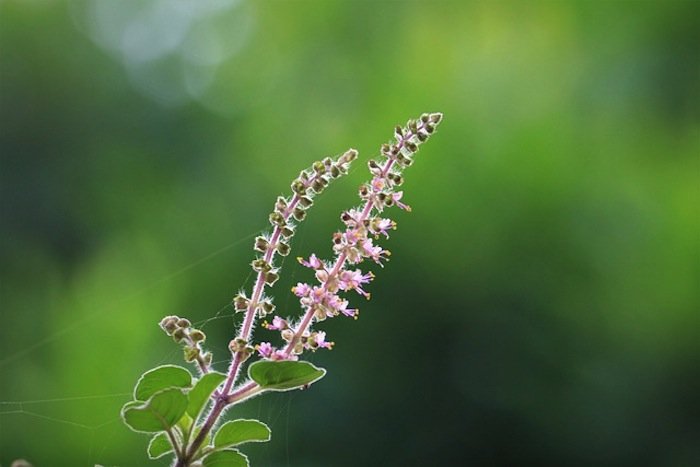Tulsi/Holy Basil and It’s importance
Tulsi, also known as Holy Basil, is an aromatic plant that is native to India and has been used for centuries in traditional Ayurvedic medicine. The plant is considered sacred in Hinduism and is often grown in homes and temples as a symbol of purity and good fortune.
Tulsi is a perennial herb that grows up to 60 cm in height and has hairy, green leaves and purple or white flowers. It is easy to grow and can be propagated by rooting stem cuttings or seeds.
Tulsi is prized for its medicinal properties and is used to treat a wide range of ailments, including stress, anxiety, and respiratory issues. It is believed to have anti-inflammatory, antioxidant, and immune-boosting effects. Tulsi is also used as an adaptogen, which means that it can help the body adapt to physical and emotional stress.
In addition to its medicinal uses, Tulsi is also used in cooking and as a natural insect repellent. The leaves and flowers of the plant can be added to salads, curries, and other dishes for a refreshing and fragrant flavor.
Tulsi is easy to incorporate into daily life and can be consumed as a tea, tincture, capsule, or dried herb. It is generally safe to consume, but it is important to speak with a healthcare provider before using Tulsi as a medicinal herb, especially if you are pregnant or have a medical condition.
Overall, Tulsi is a versatile and beneficial plant that has been used for centuries in traditional medicine. Its medicinal properties and calming effects make it a valuable addition to any home or garden.
Tulsi, also known as Holy Basil, is an aromatic plant that has a long history of use in traditional Ayurvedic medicine. It is believed to have a number of medicinal properties and is used to treat a wide range of ailments. Here are some of the most notable medicinal uses of tulsi:
- Stress and anxiety: Tulsi is often used as a natural remedy for stress and anxiety, as it is believed to have a calming effect on the mind and body. It is thought to work by reducing levels of the stress hormone cortisol and increasing levels of the feel-good hormone serotonin.
- Respiratory issues: Tulsi is commonly used to treat respiratory issues such as colds, flu, and bronchitis. It is believed to have expectorant and decongestant properties, which can help clear mucus from the respiratory system and relieve congestion.
- Cardiovascular health: Some studies suggest that tulsi may have a positive effect on cardiovascular health by reducing blood pressure, cholesterol levels, and the risk of heart disease.
- Diabetes: Tulsi is believed to have anti-diabetic effects and may help lower blood sugar levels in people with diabetes.
- Inflammation: Tulsi is thought to have anti-inflammatory properties and may be effective in reducing inflammation in the body.
- Skin health: Tulsi is often used in traditional skincare remedies due to its antioxidant and antibacterial properties. It is believed to help reduce acne and other skin conditions.
- Digestive health: Tulsi is thought to aid in digestion and may be effective in relieving constipation and other digestive issues.
- Fever: Tulsi is believed to have antipyretic properties, which means that it can help reduce fever. It is often used in traditional remedies for this purpose.
- Headaches: Tulsi is thought to have pain-relieving and headache-reducing effects, and is sometimes used as a natural remedy for migraines and other types of headaches.
- Eye health: Tulsi is believed to have antioxidant and anti-inflammatory properties that may be beneficial for eye health. It is often used in traditional remedies to improve vision and reduce eye strain.
- Oral health: Tulsi is thought to have antibacterial properties that may help reduce the risk of cavities and gum disease. It is sometimes used in natural mouthwashes and toothpaste.
- Menstrual cramps: Tulsi is believed to have anti-inflammatory and pain-relieving effects, and is sometimes used as a natural remedy for menstrual cramps.
- Aging: Tulsi is believed to have antioxidant properties that may help reduce the effects of aging and improve overall health and well-being.
- Insect bites: Tulsi is believed to have insect-repelling properties and is sometimes used to treat insect bites and stings.
- Malaria: Some traditional medicine systems use tulsi as a natural remedy for malaria, although more research is needed to confirm its effectiveness for this purpose.
- Cancer: Some early studies have suggested that tulsi may have anti-cancer properties, but more research is needed to determine its potential as a cancer treatment.
- Memory and cognitive function: Some studies have suggested that tulsi may have a positive effect on memory and cognitive function, but more research is needed to confirm these findings.
- Kidney health: Some studies have suggested that tulsi may have a protective effect on the kidneys, but more research is needed to confirm these findings.
- Dental health: Tulsi is believed to have antibacterial properties that may help reduce the risk of cavities and gum disease. It is sometimes used in natural mouthwashes and toothpaste.
- Diabetes: Some studies have suggested that tulsi may have anti-diabetic effects and may help lower blood sugar levels in people with diabetes.
It is important to note that while tulsi is generally considered safe and has a long history of use in traditional medicine, more research is needed to fully understand its medicinal properties and potential risks. If you are considering using tulsi for medicinal purposes, it is important to speak with a healthcare provider to determine the appropriate dose and ensure that it is safe for you to use.
For more articles on Ayurveda, Kindly Click here.
For Pharmaceutical Jobs follow us on LinkedIn

